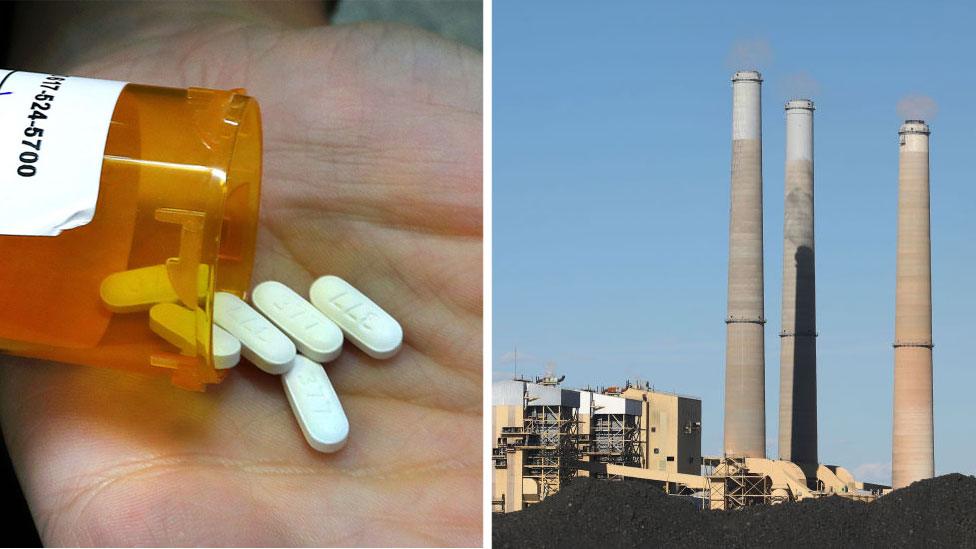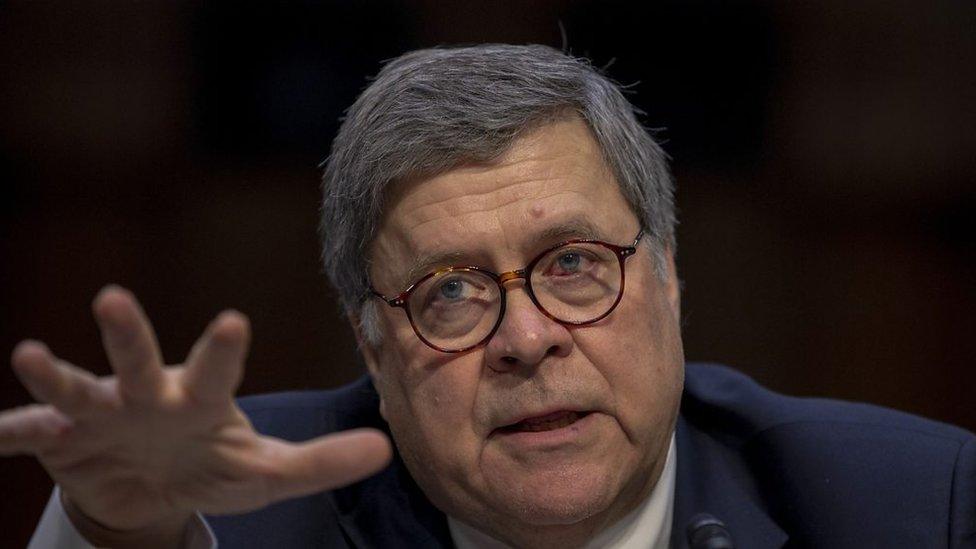Democrat Amy Klobuchar announces presidential bid
- Published
Snow was falling when US senator Amy Klobuchar announced her candidacy
Minnesota Democratic Senator Amy Klobuchar has announced she is running for president in the 2020 election.
Ms Klobuchar, a former prosecutor, said she was running for "everyone who wanted their work recognised".
She won praise for grilling Supreme Court Justice Brett Kavanaugh and attorney general nominee William Barr during recent confirmation hearings.
The 58-year-old enters an increasingly crowded field of Democrats competing to challenge President Donald Trump.
Ms Klobuchar called on people to join her "home-grown" campaign, saying, "I don't have a political machine. I don't come from money. But what I do have is this: I have grit."
A record total of five women have so far entered the race for the presidency - these also include Elizabeth Warren, Kamala Harris, Tulsi Gabbard, and Kirsten Gillibrand.
On her first full day of presidential campaigning, Ms Warren - a senator from Massachusetts - told supporters: "By the time we get to 2020, Donald Trump may not even be president. In fact, he may not even be a free person."
Who is Amy Klobuchar?
After working as a lawyer in a private firm, she became chief prosecutor for Hennepin, Minnesota's most populous county, in 1998.
Eight years later, she was elected to the Senate to represent Minnesota.

Ms Klobuchar is the fifth woman to run for the Democratic nomination
Ms Klobuchar has long prided herself in her bipartisanship; on being able to, as she wrote in her 2015 memoir, "disagree without being disagreeable".
"Courage is about whether or not you're willing to stand next to someone you don't always agree with for the betterment of this country," she wrote.
It is this approach that has given her a reputation for being "Minnesota nice" - but it also, in her early years, reportedly earned her the unflattering nickname "Cotton Candy Amy", external in some circles.

The dark horse candidate
Analysis by Anthony Zurcher
Her kick-off rally looked like a scene out of the Disney film Frozen, with a snow-covered crowd gathered near the banks of an icy river. Amy Klobuchar's newly announced presidential campaign, however, could generate some heat in 2020.
She may not have the same level of name recognition as recent and future entrants into the race, but the three-term Minnesota senator has shown the ability to win votes in the kind of Midwestern battleground state that Donald Trump appealed to in 2016.
She offers a steady, sensible political outlook that could attract the majority of Democratic voters who are more interested in electability than ideological purity.
Her buzz has been dampened a bit by recent allegations that she has been abusive toward her staff, but she may try to turn the criticism into a strength.
"I have high expectations for the people that work for me," she told NBC News after her speech, "but I have high expectations for this country."
Ms Klobuchar has become a fashionable pick as a "dark horse" candidate. It wouldn't be a shock if she has a good showing in the neighbouring-state Iowa caucuses and rides that momentum deep into the primary season.

After years under the radar, the former prosecutor went viral last September for her tense exchange with Justice Brett Kavanaugh, external over his history of drinking.
In January this year, she proved that this frank interrogation style was not a one-off when she grilled President Trump's attorney general nominee Mr Barr about obstruction of justice allegations.
Meanwhile, former employees of Ms Klobuchar have disputed her "Minnesota nice" image too, telling the Huffington Post that at least three potential campaign managers have withdrawn, external over her treatment of staff.
Klobuchar asks Barr about obstruction
What are her views?
In an age when political views are condensed into 280 characters and measured in retweets, Ms Klobuchar's reputation for working away in the background could help her stand out.
She was able to turn 43 Trump-voting Minnesota counties over to her side in last year's mid-term elections.
But her bipartisan approach may not stand her in such good stead in a party now dominated by the progressive left.
For example, while she has publicly spoken out against President Trump's immigration and border policies, she has not voiced her support for the movement to abolish US Immigration and Customs Enforcement (ICE).
Two of her opponents, Kirsten Gillibrand and Ms Warren, have openly called for the agency to be dismantled, while Ms Harris has said it needs to be "critically re-examined".
She has also avoided supporting Bernie Sanders' single-payer healthcare bill, known commonly as Medicare for All, preferring to back a "sensible transition" instead.
Many on the left also feel that her education reforms, which push for universities in the US to be more affordable, do not go far enough.
Ms Harris, and likely opponent Mr Sanders, both support making college tuition almost entirely free, external.
- Published4 February 2020

- Published8 November 2018
- Published18 January 2019
